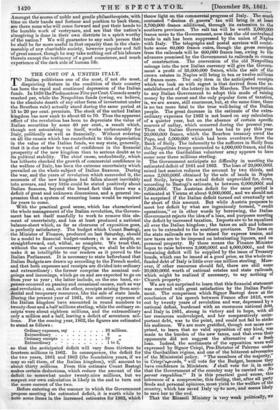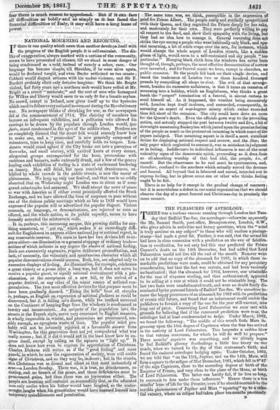THE COST OF A UNITED ITALY.
TO Italian politicians one of the most, if not the most, disquieting feature in the condition of their country has been the rapid and continued depression of the Italian funds. In 1858 the Piedmontese Five per Cent. Consols nearly reached par, while the Neapolitan funds (owing, we believe, to the absolute dearth of any other form of investment under the Bourbon rule) actually stood during the same period at 15 to 20 per cent. premium. The stock of the united Italian kingdom has now sunk to about 65 to 70. Thus the apparent effect of the revolution has been to depreciate the value of Italian securities by some 40 per cent., a result which, though not astonishing in itself, works unfavourably for Italy, politically as well as financially. Without entering on all the causes which has contributed to this depreciation in the value of the Italian funds, we may state, generally, that it is due rather to want of confidence in the financial prosperity of the new kingdom than to serious doubt as to its political stability. The chief cause, undoubtedly, which has hitherto checked the growth of commercial confidence in the welfare of Italy, has been the extreme uncertainty which prevailed on the whole subject of Italian finances. During the war, and the years of revolution which succeeded it, the accounts of the new kingdom had fallen almost inevitably into arrears, and very little could be stated positively about Italian finances, beyond the broad fact that there was a deficit of great and unknown dimensions, and a general im- pression that a system of recurring loans would be required for years to come.
With the practical good sense, which has characterized the whole management of the Italian revolution, the Govern- ment has set itself manfully to work to remove this ele- ment of uncertainty, and has at least produced a national balance-sheet which, as far as clearness of exposition goes, is perfectly satisfactory. The budget which Count Bastogi, the Minister of Finance, produced on last Saturday, should be a model to financial budget-makers ; it is so simple, so straightforward, and, withal, so complete. We trust that, without the use of unnecessary figures, we shall be able to make it as intelligible to our readers as it proved to the Italian Parliament. It is necessary to state beforehand that Italian Budgets are drawn up according to the French model, and that both expenses and receipts are divided into ordinary and extraordinary : the former comprise the nominal out- goings and incomings, which go on and are expected to go on from year to year ; the latter include, on the one hand, ex- penses occurred on passing and occasional causes, such as war and revolution ; and, on the other, receipts arising from acci- dental and temporary resources, like the sale of state lands. During the present year of 1861, the ordinary expenses of the Italian kingdom have amounted in round numbers to twenty-four and a half millions sterling, while the ordinary re- ceipts were about eighteen millions, and the extraordinary only a million and a half, leaving a deficit of seventeen mil- lions. For the coming year, 1862, the figures are estimated to stand as follows : Ordinary expenses, say
Extraordinary Ordinary receipts Extraordinary • so that the anticipated deficit will vary from thirteen to fourteen millions in 1862. In consequence, the deficit for the two years, 1861 and 1862 (the foundation years, if we may so call them, of the Italian kingdom), will amount to about thirty millions. From this estimate Count Bastogi makes certain deductions, which reduce the amount of the deficit to somewhat under twenty.nine millions, but we suspect our own calculation is likely in the end to turn out the more correct of the two.
Before entering on the manner in which the Government propose meeting the estimated deficit, it is worth while to note some items in the increased estimates for 1862, which 28 millions.
6 11
19 „ 1 to 2, throw light on the commercial progress of Italy. The much contested " decima di guerra" tax will bring in at least 3,700,000 francs additional, through its extension to the southern provinces. The salt tax will be worth 2,000,000 francs more to the Government, now that the old contraband trade in salt has been suppressed by the union of Naples with Italy. The telegraphs and postal services will contri- bute some 80,000 francs extra, though the gross receipts from the railroads will be 600,000 francs less, owing to the advances promised by the Government to railroads in course of construction. The conversion of the old Neapolitan coinage into the new Italian currency will give the Govern- ment a profit of 35,000,000 francs, while the sale of the crown estates in Naples will bring in ten or twelve millions of francs more. The only item in the anticipated receipts which we look on with regret is that derived from the re- establishment of the lottery in the Marches. The temptation to any Italian Government to adopt this mode of raising money by the surest and the only popular form of taxation, is, we are aware, still enormous, but, at the same time, there is no tax more fatal to the true well-being of the Italian people. The great decrease in the estimate of the extra- ordinary expenses for 1862 is not based on any calculation of a quieter year, but on the absence of certain specific sources of outlay, which occurred during the present year. Thus the Italian Government has had to pay this year 20,000,000 francs, which the Bourbon treasury owed the Pope, and 5,000,000 which had been overdrawn from the Bank of Sicily. The indemnity to the sufferers in Sicily from the Neapolitan troops amounted to 4,000,000 francs, and the outlay on the Garibaldian volunteer army appears to have come near three millions sterling. The Government anticipate no difficulty in meeting the estimated deficit of 1861 and 1862. The loan of 20,0007000/. raised last session reduces the amount by two thirds, and some 2,000,000/. obtained by the sale of lands in Naples and Sicily, brings the actual deficit unprovided for, down, according to Bastogi's estimate, to between 6,000,0001. and 7,000,000/. The Austrian deficit for the same period is estimated at Vienna at about 9,000,000/., and we should not be surprised if the Italian deficit turned out eventually not far short of this amount. But while Austria proposes to meet her deficit by what are ingeniously termed, credit operations," or in other words by borrowing, the Italian Government rejects the idea of a loan, and purposes meeting the deficit by increased taxation. Imposts are to be equalized all over the Italian kingdom ; the taxes on salt and tobacco are to be extended to the southern provinces. The fares on the state railroads are to be raised for express trains, and new taxes are to be imposed on intoxicating liquors, and on personal property. By these means the Finance Minister hopes to raise between 3,000,000/. and 4,000,000/., and the remaining deficit will be supplied by the issue of Treasury bonds, which can be issued at a good price, as the whole un- funded debt of Italy is little over one million sterling. More- over, if other resources should fail, there are still some 20,000,000/. worth of national estates and state railroads, which might be realized if necessary, to say nothing of Church property. We are not surprised to learn that this financial statement was received with great satisfaction by the Italian Parlia- ment. The comparison which Signor Bastogi drew at the conclusion of his speech between France after 1815, worn out by twenty years of revolution and war, depressed by a national defeat, burdened with an enormous national debt, and Italy in 1861, strong in victory and in hope, with all her resources undeveloped, and her comparatively unim- portant debt, was to the point, and could not fail to strike his audience. We are more gratified, though not more sur- prised, to learn that no valid opposition of any kind, was made to the burden of the new taxes, and that even their opponents did not suggest the alternative of a fresh loan. Indeed, the sentiments of the opposition were well expressed by Signor Crispi, Pro-Dictator of Palermo under the Garibaldian regime, and one of the bitterest adversaries of the Ministerial policy. "The members of the majority," in Crispesiwords, will vote for the Budget, because they have confidence in Ministers. I shall vote for it, in order that the Government of the country may be carried on. Ne pereat respublica." It is this practical good sense, this tolerance of a compromise, this feeling, that, after all party feuds and personal opinions, must yield. to the welfare of the country, which has saved Italy up to now, and seems likely to save her to the end.
That the Ricasoli Ministry is very weak politically, we fear there is natieh reason to apprehend. But if it eau face all difficulties as boldly and as simply as it, has faced the financial difficulties Of Italy, it may still have along lease of - ..1 power.





























 Previous page
Previous page